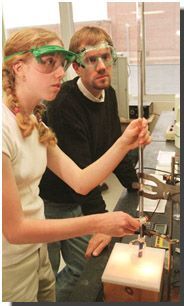| Click on the image to enlarge. |
This new Education Week series will follow Assistant Editor David J. Hoff, and Photo Editor Allison Shelley, as they both follow teachers participating in the National Science Foundation’s Teachers Experiencing Antarctica and the Arctic. We hope to bring you updates from Mr. Hoff about his own experiences in the Antarctic, as well as his dispatches from the field about the NSF program and its participants, along with photos.
Getting to Antarctica is no trip to the mall. Because medical emergencies in Antarctica are not easily resolved, the NSF requires visitors to undergo a rigorous medical and dental examination prior to leaving. The official U.S. Antarctic Program guidebook devotes an entire chapter on what and how to pack.
The first leg of the journey takes them to Los Angeles, then to Auckland, New Zealand, and then to Christchurch (see map, above).

|
Fearless Photo Editor Allison Shelley. We hope she’ll be dressing more warmly than this. |
“That flight alone is 18 hours long, and because you cross the international dateline, you lose a day in transit,” said Ms. Shelley.
Once in Christchurch, the pair will repair to the CDC (clothing distribution centers) to be outfitted for their ECW (extreme cold weather) gear.
An eight-hour journey to McMurdo Station, which serves as base-camp, completes phase one of the trek.
After landing at McMurdo station (on a runway laid out on sea ice), several days attendance at “snow school” is required.
“I believe that besides learning how to survive the eventuality of the harshest, or at least coldest, happenstances on earth, we will also be learning to make igloos,” said Ms. Shelley.

|
| Our intrepid reporter/expeditioner, David J. Hoff, right, learns from a Hanover High School, N.H., student. —Allison Shelley |
Cold-weather photography requires special planning. Ms. Shelley consulted photographers who have operated in such extremes. “All of my gear will be autofocus and operate on semi-auto settings so that I don’t have to take my hands out of the gloves to make adjustments. I will also be using lithium batteries—they work better and last longer—in very cold conditions,” Ms. Shelley said.
Ms. Shelley, who hails from Long Beach, Calif., has been Education Week‘s photo editor/chief photographer for eight months. Prior to that she was a daily newspaper staff photographer. Of the world’s seven continents, Antarctica will be the sixth that she has travelled. She is not overly fond of cold weather, she says.
Likewise, the process of reporting and writing in Antarctica will be different for Mr. Hoff than what he does week-to-week at Education Week, Mr. Hoff said.
“For most stories, you have a concept of what you’re going to see and experience before you go,” he said. “Even though I’ve been reading about life in Antarctica, I still can’t picture it. It remains a mystery to me, and I don’t have a clue as to how I’m going to describe it.”
Mr. Hoff has been writing about education for nine years, the past four years as a staff writer and assistant editor at Education Week. He currently covers curriculum issues in math and science. His wife and 3-year-old and 8-month-old sons will be patiently awaiting his return. “This trip promises to be the highlight of my career so far—and maybe even the adventure of a lifetime,” said Mr. Hoff.



